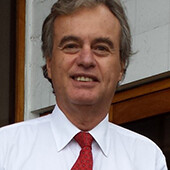My country, Peru, is the only example in Latin America of a failed democracy. Alberto Fujimori—who as president from 1990 to 2001 was, next to Fidel Castro, the longest-ruling head of state in Latin America—led a regime that intentionally used the public’s fear of crime as an instrument to remain in power. More than in any other country in the region, crime was a legitimating argument for authoritarian measures and a sure way to gain the support of the people.
Yet Peru has seen dramatic changes in the last two years. With the fall of Fujimori, the justice system is prosecuting those responsible for the worst human rights crimes and instances of corruption, including important members of the previous regime. A new opportunity for democratic government is in place.
One of the changes is the appointment of a group of human rights people to the Ministry of the Interior, myself included. This ministry is in charge of citizen security, public order, and anti-drug and antiterrorist efforts. We are also responsible for fighting crime, which means we are in charge of the police. We veteran human rights activists are thus on the other side of the fence, trying to put into practice what we have been preaching all of these years.
My time at the ministry has confirmed the perception my colleagues and I had of the police force before joining the government. The Peruvian police are not by any means the most repressive in Latin America—the Brazilian, Venezuelan, Argentinean, and Colombian forces have worse records in human rights terms. Yet police officials in Peru—even those who say they respect human rights—believe that those rights are a major obstacle to their ability to deal effectively with crime. Looking at the situation now through a government lens I see that the pressure to put into practice measures that violate human rights comes not only from the police, but also from the people. In fact, poor people are the ones who demand the harshest measures against crime, as they are most frequently its victims. And since they cannot afford private security, they depend more than other groups on the police to ensure their safety.
Within the Ministry of the Interior, we are developing police reforms to address this perceived tension between respecting human rights and keeping Peruvians safe from crime. Some of our ideas include demilitarizing the police force—affirming its civilian identity by distinguishing it from the army—and changing the mission of the police to protecting the rights of citizens rather than making the state “secure.” It may take decades for these ideas to take root both institutionally and among individual officers.
Over the years, I have learned three valuable lessons about how to address the crime challenge. First, in politics, it is important to win the center, and thus avoid the risk of marginalization. Human rights organizations should do more than just protect the rights of criminals; they must also find a way to address security concerns of the public. This is critical to gain the trust of the general population.
Second, it is also important to win the hearts of the police. Human rights organizations rarely publish statements when the rights of the police are abused, or when members of the force are killed or treated unfairly. This omission is devastating for the police perception of human rights organizations. We need to remember that they are the brothers and sisters of the victims of abuse, the cousins of the human rights activists. At the ministry we are addressing this problem through a newly established special office devoted to human rights abuses within the police force.
The final lesson: while working toward these goals, it is important to continue the classic human rights work we have been doing all along. In Peru the fear of being accussed of abuse by the human rights community does more to stop police officers from committing human rights violations than fear of the law. While stressing innovation and engaging creatively with new actors, it is important to continue using our tried-and-true approach of holding violators accountable.



